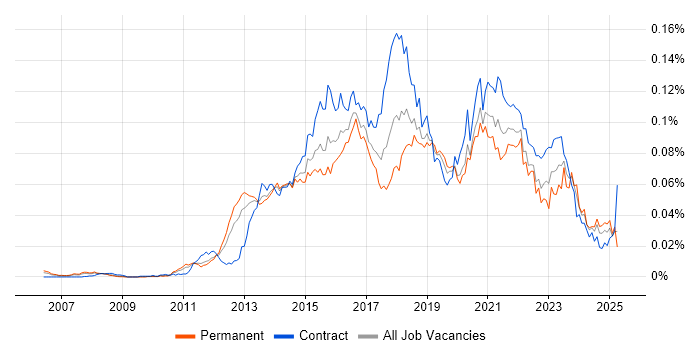Digital Solution Architect
UK
The median Digital Solution Architect salary in the UK is £65,000 per year, according to job vacancies posted during the 6 months leading to 17 May 2025.
The table below provides salary benchmarking and summary statistics, comparing them to the same period in the previous two years.
| 6 months to 17 May 2025 |
Same period 2024 | Same period 2023 | |
|---|---|---|---|
| Rank | 710 | 860 | 925 |
| Rank change year-on-year | +150 | +65 | +168 |
| Permanent jobs requiring a Digital Solutions Architect | 20 | 39 | 45 |
| As % of all permanent jobs advertised in the UK | 0.036% | 0.039% | 0.045% |
| As % of the Job Titles category | 0.039% | 0.041% | 0.049% |
| Number of salaries quoted | 13 | 10 | 37 |
| 10th Percentile | £62,000 | £67,500 | - |
| 25th Percentile | - | £85,625 | £73,750 |
| Median annual salary (50th Percentile) | £65,000 | £93,750 | £80,000 |
| Median % change year-on-year | -30.67% | +17.19% | -11.11% |
| 75th Percentile | £75,000 | £102,500 | £95,000 |
| 90th Percentile | £101,000 | - | £108,000 |
| UK excluding London median annual salary | £65,000 | £95,000 | £77,500 |
| % change year-on-year | -31.58% | +22.58% | +3.33% |
All Permanent IT Job Vacancies
UK
For comparison with the information above, the following table provides summary statistics for all permanent IT job vacancies. Most job vacancies include a discernible job title that can be normalized. As such, the figures in the second row provide an indication of the number of permanent jobs in our overall sample.
| Permanent vacancies in the UK with a recognized job title | 50,706 | 94,386 | 91,123 |
| % of permanent jobs with a recognized job title | 90.83% | 94.69% | 91.49% |
| Number of salaries quoted | 27,254 | 67,482 | 57,423 |
| 10th Percentile | £29,750 | £28,500 | £32,500 |
| 25th Percentile | £41,250 | £38,500 | £45,000 |
| Median annual salary (50th Percentile) | £56,000 | £52,500 | £60,000 |
| Median % change year-on-year | +6.67% | -12.50% | - |
| 75th Percentile | £73,886 | £71,000 | £80,000 |
| 90th Percentile | £96,250 | £90,000 | £100,000 |
| UK excluding London median annual salary | £51,645 | £50,000 | £53,000 |
| % change year-on-year | +3.29% | -5.66% | +5.64% |
Digital Solutions Architect
Job Vacancy Trend
Job postings that featured Digital Solutions Architect in the job title as a proportion of all IT jobs advertised.

Digital Solutions Architect
Salary Trend
3-month moving average salary quoted in jobs citing Digital Solutions Architect.
Digital Solutions Architect
Salary Histogram
Salary distribution for jobs citing Digital Solutions Architect over the 6 months to 17 May 2025.
Digital Solutions Architect
Top 8 Job Locations
The table below looks at the demand and provides a guide to the median salaries quoted in IT jobs citing Digital Solutions Architect within the UK over the 6 months to 17 May 2025. The 'Rank Change' column provides an indication of the change in demand within each location based on the same 6 month period last year.
| Location | Rank Change on Same Period Last Year |
Matching Permanent IT Job Ads |
Median Salary Past 6 Months |
Median Salary % Change on Same Period Last Year |
Live Jobs |
|---|---|---|---|---|---|
| England | +116 | 16 | £65,000 | -30.67% | 7 |
| UK excluding London | +157 | 12 | £65,000 | -31.58% | 3 |
| Midlands | - | 11 | £65,000 | - | |
| East Midlands | - | 8 | £65,000 | - | |
| Work from Home | +120 | 7 | £82,500 | -13.16% | 3 |
| London | +112 | 5 | £102,500 | +10.81% | 4 |
| West Midlands | - | 3 | £75,000 | - | |
| Scotland | - | 1 | - | - |
Digital Solutions Architect Skill Set
Top 30 Co-occurring Skills and Capabilities
For the 6 months to 17 May 2025, Digital Solutions Architect job roles required the following skills and capabilities in order of popularity. The figures indicate the absolute number co-occurrences and as a proportion of all permanent job ads featuring Digital Solutions Architect in the job title.
|
|
Digital Solutions Architect Skill Set
Co-occurring Skills and Capabilities by Category
The follow tables expand on the table above by listing co-occurrences grouped by category. The same employment type, locality and period is covered with up to 20 co-occurrences shown in each of the following categories:
